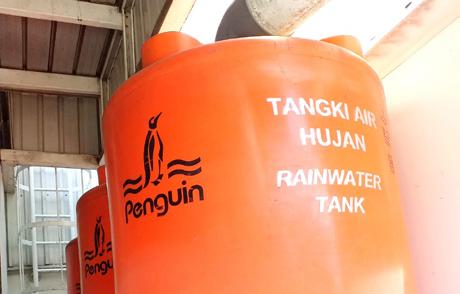
11 minute read
Aims and Initiatives
Community involvement
The aims
No. 1: No poverty No. 2: Zero hunger No. 3: Good health and well-being No. 4: Quality education No. 5: Gender equality No. 10: Reduced inequalities
are an integral part of the aim of humane work and economic growth for Faber-Castell. The goals can be supported through complying with the Social Charter, since Faber-Castell employees, for example, have safe working conditions, receive regular fair payments and also have access to clean drinking water.
Graf von Faber-Castell Children’s Fund Foundation
The well-being of children has always played an important role for Faber-Castell. This is why Count Anton Wolfgang von Faber-Castell (8th generation) launched a children’s fund foundation in 2001. Ever since then, this charity has supported humanitarian children's aid projects in nurseries, schools, children's hospitals and orphanages, especially in emerging countries. The “Little Flower” project, for example, is dedicated to the care and support of young and adult patients in a small village in northern India. Thanks to donations from the Graf von Faber-Castell Children's Fund Foundation, bunk beds could be built, mattresses bought and the furniture improved. Teaching materials could also be purchased.
Project Tabaluga from Eberhard Faber
Tabaluga is a small green dragon who is sent on an adventurous journey by his father. On this journey he has experiences that are familiar to children: he is scared, he encounters hatred, he seeks love, finds friendship and discovers joy for life. Tabaluga stands for a world in which tolerance, social competence and non-violence take centre stage. The little dragon is the mascot of the Peter Maffay Foundation for traumatised children. Every year about 500 children take advantage of the foundation’s therapeutic services. One particular aim of the foundation is to encourage children’s imagination and creativity. The foundation seeks to make children strong: it helps them overcome negative experiences and gain new strength. Some of the proceeds from the sale of Eberhard Faber’s Tabaluga products go directly to the Peter Maffay Foundation and thus support its work.



Children of the World Project (“Caras & Cores”)
Giving children the opportunity to draw a good representation of their own skin colour strengthens their self-image and identity. However, the colour spectrum of many coloured pencil sets, especially for children, is limited. To date it has not been possible to represent the different pigmentation of the skin without compromise. The six skin colour pencils developed with the help of make-up experts can be mixed together to create every shade of colour. They are part of a standard coloured pencil set, so there is no need to buy a separate skin colour set. The pencils used to represent skin tones are therefore a valuable, creative tool in the important phase of self-discovery and growing up. In this way Faber-Castell is supporting parents and teachers in their educational work. Proceeds from the sale go to the Red Pencil Humanitarian Mission, which supports children in crisis areas with painting therapies.
Faber-Castell Brazil’s social engagement
Faber-Castell has worked closely with local communities for many years to allow the population to partake in the company's economic success. The “Faber-Castell Institute” offers a system of support and education measures, supported by voluntary donations from our employees. The company doubles every Brazilian real (R$) voluntarily donated by our employees, increasing the donation fund to support communities where the need is greatest.
Some of our latest projects:
a) Crèche Dalela Tannús, Prata
Financial support for a local daycare centre in Prata for around 160 children up to six years old. Currently, there are 17 carers looking after the children.
b) Madre Cabrini, São Carlos
The project in São Carlos supports about 120 children from precarious family situations who, among other things, are facing domestic violence and other types of abuse. This day care facility provides children aged 6 to 14 years with protection and care, leisure activities, homework help and food. It also offers training courses to teens and adults. 9 full-time employees and 20 volunteers have kept this flagship project alive for many years.
c) ADEFAV, São Paulo
The NGO has set itself the goal of socially and educationally supporting people with deafblindness, visual impairments and/or multiple disabilities through intervention, rehabilitation and family training. The aid for 45 children with multiple disabilities aged 0 to 18 years is supported through donations from individuals and state enterprises. The support of Faber-Castell meant the swimming pool could be renovated and the building refurbished.
d) Julião community, Manaus
This community is located on the banks of the Rio Negro, 30 minutes by boat from Manaus. 60 families live there, mainly on welfare. Around 40 children aged from 3 to 12 years attend the state school and usually leave after year 5. Faber-Castell helped set up a better social infrastructure, for example by building a sports field with toilets and a multi-purpose area.
Strategy for alternative plastic resources and initiatives
Faber-Castell has set itself the aim of continuously reducing the use of conventional plastics. This aim will be achieved through the increased use of recycled plastic as a raw material (especially for products). In addition, single-use or disposable packaging is to be replaced by more eco-friendly materials like paper or recycled plastic.
Recycled plastic products from Faber-Castell Germany in sustainable packaging
Working closely with the production site in Austria, some environmental improvements have been made in the markers produced there. Firstly, the Textliner 46 was converted to recycled plastic. The housing (cap and barrel) consists of 100% recycled plastic. The packaging is also completely made from recycled plastic, putting the finishing touch on the concept.
Furthermore, there is a Special Edition on the theme of “Travel” with the Textliner 46s in eco-friendly cardboard packaging. The promotional display consists of 100% recycled plastic.
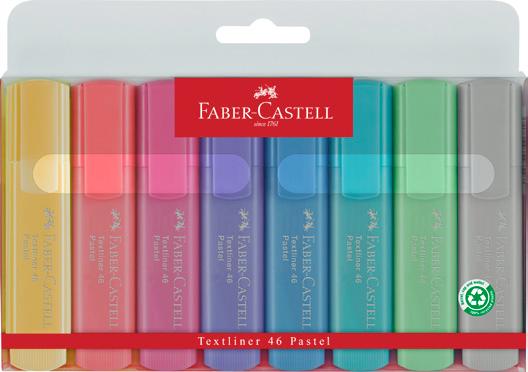

100% recycled p la s t i c P l a s t ic packaging 100% recycled p la s t i c Barrel and cap Faber-Castell Germany is converting the blister packs to recycled material
Another project from Germany to reduce conventional plastics is the conversion of the blister packs. Their conventional plastic blister packs have been switched to 95% recycled plastic packs.
95% recycled p la s t i c P las tic packaging
Faber-Castell Peru is switching from plastic to cardboard packaging
Plastic packaging is an increasing environmental problem. This is why Faber-Castell Peru has taken its first step and switched children's marker packaging to cardboard. By 2020, 23 items (SKUs) had already been switched to recyclable cardboard packaging. On this basis, new packaging designs and alternatives made from cardboard will be developed for the blister cards (plastic covers).
Recycled plastic products from Faber-Castell Peru
Faber-Castell Peru is also focusing on the use of recycled materials. They are working with local and North American suppliers to also keep the environmental impact of the supply chain and transport routes low. One ballpoint pen and seven markers have already been produced using recycled post-industrial materials.
Recyclable car dbo a r d C a r d boar d packaging
Trilux Style ballpoint pen standard colours

88% recycled p la s t i c A l l p lastic parts
Jumbo permanent marker 23
83% recycled p la s t i c A l l p lastic parts
The cooperation between Faber-Castell Brazil and TerraCycle
Faber-Castell Brazil is cooperating with the recycling company TerraCycle, which organises the reuse of plastic from pencil waste. Non-refillable plastic writing instruments and accessories such as ballpoint pens, markers, erasers or sharpeners are collected centrally and processed into new raw materials. In this way Faber-Castell not only reduces its waste volumes, but also optimises the use of resources.
June 2018 June 2019 October 2020 Change
Participants 3,736 4,383 5,252
20 %
Total number of items collected 1,389,145 1,773,093 2,034,825 15 %
Faber-Castell New Zealand is switching to sustainable blister packs
The packaging was switched to 100% FSC-certified card, the printed colours are made from food-grade soy inks – all made in New Zealand and 100% recyclable. The new (locally produced) blister packs are made from soft, food-grade PVC with the #R3 stamp, which means that they have already been recycled for the third time, meaning that they are both recycled and recyclable.
Use of certified wood and extended use of local timber resources
All wood-cased pencils produced by Faber-Castell are made of certified wood. Currently, Faber-Castell is also working on using local resources to minimise transport routes in the future.
Klimaneutrale Pro du k t i on C arb o n neutral production The Grip colour and graphite pencils from Faber-Castell Germany
All Colour and Jumbo Grip pencils make a significant contribution to climate protection: They are made from wood from sustainably managed forests, covered with eco-friendly water-based varnish and their manufacture in Germany is carbon-neutral.
The “Naturals” concept of Faber-Castell Australia
The "Naturals” range consists of sustainable colour pencils, graphite pencils and erasers. The wood-cased pencils are made from FSCcertified wood, meaning they come from sustainably managed forests. The erasers are PVC-free and are manufactured without harmful softeners. No plastic is used in the packaging, 100% recycled cardboard is used instead. The wood-cased pencils are made by Faber-Castell Indonesia and the erasers by Faber-Castell Malaysia.
The cooperation between Faber-Castell Malaysia and WWF Malaysia
The extinction of species is progressing rapidly: the number of wild animal species has declined by 70% since 1970.4 Malaysia is one of 17 megadiversity countries, which means that together these countries have a high density of biodiversity and are home to around 70% of terrestrial species5. Faber-Castell Malaysia began cooperating with WWF Malaysia in order to raise awareness of the problem of endangered species in the country. Together with Malaysian artist Marty Wood, Faber-Castell designed postcards with motifs of endangered species to colour in. They are part of a themed set with Goldfarber colour pencils made from sustainable wood and in a carbonneutral fashion. By purchasing this Limited Edition, the consumer is helping to protect the species through WWF Malaysia projects. Cardboard sleeve and postcards are certified FSC Mix or FSC Recycled.

Klimaneutrale Pro du k t i on C arb o n neutral production
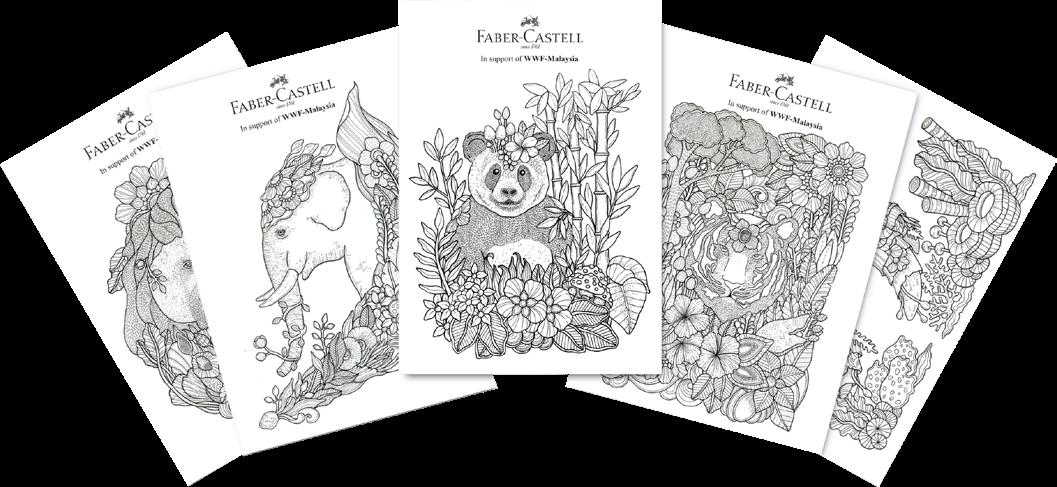
Reducing the carbon footprint
Alongside the annual compensation for the corporate carbon footprint, Faber-Castell has set itself the aim of also continuously reducing this footprint. Across the Group, freight and power consumption are the main CO2 sources that are to be reduced by a number of targeted initiatives. For example, Faber-Castell is already using 100% green electricity in our plants in Peru, Brazil, Austria and Germany (since January 2020). In order to further increase the proportion of carbon-neutral energy sources, solar projects are currently being implemented in our Southeast Asian sites. In addition, we have also begun to observe the environmental impact of selected products (in-house production and retail products).
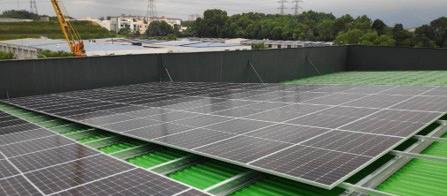
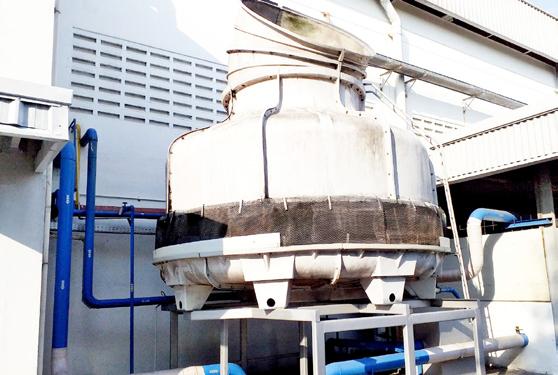
Faber-Castell Malaysia installed a solar power system
Solar cells are currently being installed on the roof of the factory in Kuala Lumpur in order to reduce both the carbon footprint and costs. The project is due to be commissioned in December 2020. Initial estimates result in an annual savings potential of 1.2 tonnes of CO2.
Power consumption reduction project in the cooling tower of Faber-Castell Indonesia
Replacing the pump motor and installing a temperature regulator in the cooling tower of the Faber-Castell factory in Indonesia meant that its average daily power consumption was halved from 0.50 MWh to 0.25 MWh. At the desired temperature, the pump motor shuts down and interrupts the electricity and water supply for cooling, so that resources are used more efficiently.
Life cycle assessment
After a life cycle assessment for wood-cased pencils manufactured in Brazil was conducted in 2017, the environmental impact of further product groups are currently being observed, including for markers, highlighters, etc. Specific results will be communicated in the next Fact Sheet.
Updating the stakeholder analysis
The existing stakeholder survey will be updated in 2020 and adapted to existing standards and targets, such as the Sustainable Development Goals (SDGs) or Global Reporting Initiative (GRI). The aim of the stakeholder survey is to define and prioritise relevant topics.
Other CSR projects
Faber-Castell Brazil installed a water treatment plant
A waste water recycling system was installed at the factory in São Carlos in Brazil in 2018. An additional treatment stage of the sanitary sewage through an ultrafiltration membrane meant that waste water was reduced in the factory. The purified water is used for cleaning outdoor areas and garden irrigation. This meant that, in just over one year after implementation, more than 12,000 m³ of waste water was prevented from entering the urban network.
The efficient use of water project by Faber-Castell Indonesia
Three water tanks, each with a 1,200 litre capacity, collect rain water and deliver efficient use of water resources. Using the rain water instead of fresh water in sewage treatment meant that 5 months of fresh water were saved in waste water treatment.

